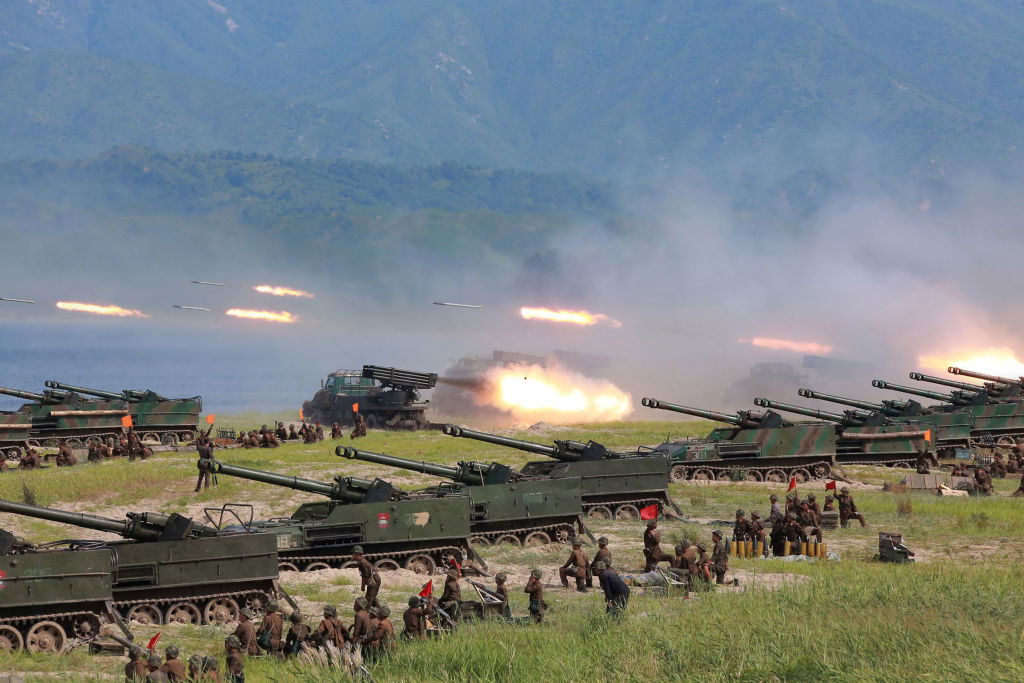By Jacob L. Shapiro
From the weekend came the usual song and dance of the North Korean nuclear crisis, right? On Saturday, the government in Pyongyang test-fired three short-range ballistic missiles to the usual mixed bag of effect. The previous day, Kim Jong Un had personally supervised a military drill in which North Korean special operations forces simulated the occupation of two South Korean islands. The tests also occurred roughly halfway through the Ulchi Freedom Guardian exercises, whereby the United States and South Korea simulate a North Korean invasion on the rest of the peninsula. Read one way, the missile tests are unusually provocative. After all, Pyongyang had not tested a missile since U.S. President Donald Trump threatened “fire and fury” against it for vowing to attack Guam. Trump and Secretary of State Rex Tillerson recently intimated that progress had been made on the diplomatic front, citing the absence of missile tests as evidence of its advancement. A missile test, then, sends a strong message: Pyongyang is unbowed, as defiant as ever. Maybe.
Read differently, however, the tests are benign, even encouraging. Far from being the familiar choreography of action and reaction, statement and response, the events of the weekend signify something more, a rare act of conciliation under circumstances that leave little room for compromise. Maybe.
A Rare Instance
This is a rare instance in geopolitics when perception matters just as much as reality. And the early signs from Washington suggest officials perceive the events of the weekend as signs of conciliation. The administration has been relatively quiet. Trump himself has offered none of the incendiary commentary for which he has become known. U.S. officials are, of course, discussing the matter privately more than they have discussed it publicly, but it’s notable that their first response was restraint, not escalation. (It is notable, too, that Seoul, which would incur more casualties than Washington from a conflict with North Korea, targeted as it is by conventional weaponry emplaced north of the demilitarized zone, has been relatively quiet. A statement from the president’s office in Seoul said the Ulchi Freedom Guardian exercises would proceed “even more thoroughly.”)
What was tested is further evidence that Washington’s read might be the correct one. Before Saturday, the last missiles tested were intercontinental and, as such, were meant to demonstrate that North Korea could strike the U.S. itself, not just Guam. Short-range ballistic missiles such as the ones tested this weekend are no threat to the United States. Washington would prefer that no missiles be tested at all, but if negotiations are in fact taking place, short-range missiles are the least likely to derail them.
And Pyongyang would have reason to test them, even if peace were a viable prospect. Major military drills are happening directly across the demilitarized zone, and the government can’t help but consider them an act of provocation. For a government that has staked its legitimacy on a viable nuclear weapons program – for a government that must show its people it is undeterred in the face of provocation – testing short-range ballistic missiles is actually a measured response.
Equations Change
The fact remains that North Korea still has a nuclear weapons program it will not easily abandon. The reason it pursued such a program in the first place was survival, which is of the utmost importance for the government in Pyongyang. Deterring attacks by foreign powers with a nuclear weapon ensures its survival; attacking the United States with a nuclear weapon ensures only its destruction, considering how forcefully Washington would respond.
 This undated photo released by North Korea’s official Korean Central News Agency (KCNA) on Aug. 26, 2017, shows military exercises at an undisclosed location in North Korea. AFP PHOTO / KCNA via KNS / STR/AFP/Getty Images
This undated photo released by North Korea’s official Korean Central News Agency (KCNA) on Aug. 26, 2017, shows military exercises at an undisclosed location in North Korea. AFP PHOTO / KCNA via KNS / STR/AFP/Getty Images
But if North Korea already has a viable deterrent to attack – as it believed it had in its artillery aimed squarely at the Greater Seoul area – then its behavior in recent months may reflect not merely its need to survive but its course of action in the event it does survive. Its plan: to become powerful enough to unite the Korean Peninsula under Pyongyang’s rule, or at least to put enough pressure on the U.S. to withdraw its forces. The pressure came in the form of ICBM tests, which it believed may go unheeded if Washington was overly occupied with its own political drama. Here, North Korea miscalculated. The U.S. has made it clear that it will not tolerate a North Korean nuclear weapons program, its political distractions notwithstanding. Still, Washington has also made it clear that it prefers not to go to war on the Korean Peninsula, and so it is exhausting all diplomatic options before it does.
Does Kim think that the United States is bluffing, or does he think that the U.S. will strike North Korea to prevent it from advancing its nuclear weapons program? If Kim thinks the U.S. will not intervene, or if he thinks he can survive a U.S. attack, then he will continue to pursue a nuclear weapons program, integral as it is to his grand plan to unite the peninsula. If, however, Kim thinks the U.S. is willing to go to war and, in going to war, defeat him, he will likely subordinate his long-term ambitions to more pressing matters of survival.
This is why perception matters, even in the face of reality. We can compare the objectives and imperatives of the U.S. and North Korea and predict their behavior accordingly. But that assumes everyone understands exactly what the other wants and fears. If North Korea’s perception of U.S. imperatives does not align with its actual imperatives, the equation changes, making the perception just as important as the imperative itself. Judging by Pyongyang’s actions of late, North Korea is scared, seeking to amend its behavior so that it can survive through talks rather than through action.








 The Road to 2040
The Road to 2040